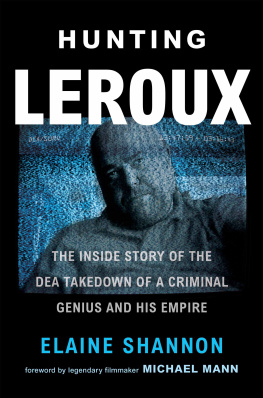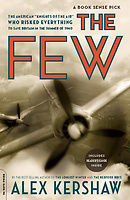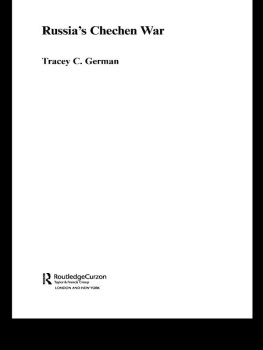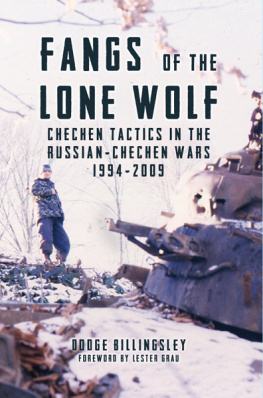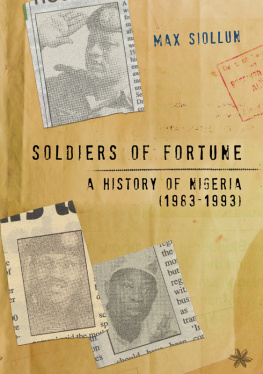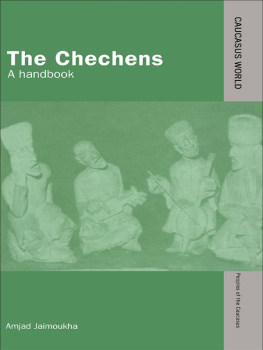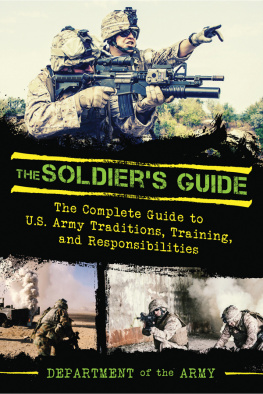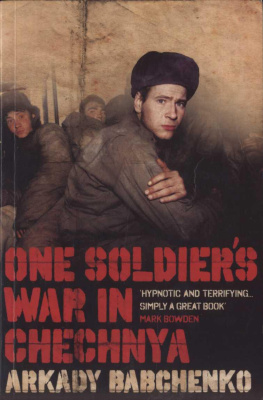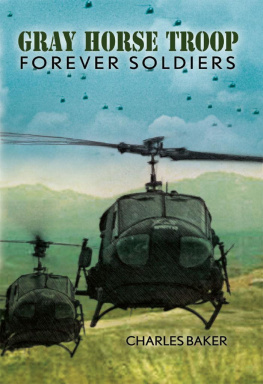ONE SOLDIERS WAR
ONE SOLDIERS WAR
ARKADY BABCHENKO
Translated from the Russian by Nick Allen

Copyright 2006 by Arkady Babchenko
Translation copyright 2007 by Nick Allen
All rights reserved. No part of this book may be reproduced in any form or by any electronic or mechanical means, or the facilitation thereof, including information storage and retrieval systems, without permission in writing from the publisher, except by a reviewer, who may quote brief passages in a review. Any members of educational institutions wishing to photocopy part or all of the work for classroom use, or publishers who would like to obtain permission to include the work in an anthology, should send their inquiries to Grove/Atlantic, Inc., 841 Broadway, New York, NY 10003.
First published in Great Britain in 2007 by Portobello Books Ltd.,
with the title One Soldiers War in Chechnya
Individual chapters were first published in Russian literary journals
during 20032006 and then in book form by Exmo in 2006
Printed in the United States of America
FIRST AMERICAN EDITION
eBook ISBN-13: 978-1-5558-4835-4
Grove Press
an imprint of Grove/Atlantic, Inc.
841 Broadway
New York, NY 10003
Distributed by Publishers Group West
www.groveatlantic.com
Contents
Preface
It would be wrong to think that the war in Chechnya began the day the federal army was brought in. And there was certainly more than one motivation behind it. Chechnya is a complex tangle of factors and accidents, a whirlwind of events that the future historian will have difficulty sorting out.
The Chechnya conflict started in the early 1990s, soon after General Dzhokhar Dudayev came to power. He had been a pilot in the Soviet air force and fought in the SovietAfghan war. From the outset he followed the policy of political independence for Chechnya, and ultimately declared its cession from the Russian Federation.
In 1991 Dudayev expelled Russian army forces from the territory of Chechnya. When the army withdrew, a huge amount of ammunition was left behind. More than two hundred airplanes were abandoned in the airport of Grozny alone, together with tanks, armored carriers, artillery and even several Grad rocket launchers. The amount of weaponry was simply astoundingwhole ammunition depots, tens of thousands of units, were simply left behind.
Lawlessness and chaos set in after Dudayev had announced a 100 percent amnesty for all criminals, without exception, which led to a huge influx into Chechnya of all kinds of people who were in trouble with the law. The immediate result was an outbreak of banditry, and before long murder and robbery had become commonplace; more often than not, non-Chechens were the victims. A wave of Russian refugees flooded into Russia from Chechnya. It would be wrong to say that the genocide of the non-Chechen population was a state policy, but Chechens, whose society is based on a system of clans known as teips, were certainly better protected. (Chechnyas current president, Ramzan Kadyrov, belongs to the Benoi Teip, for example.) Since Russians have no teip system they found themselves completely defenseless: no one was going to avenge their deaths, and this made them easy prey.
Growing gangsterism and unemployment undermined Dudayevs authority and caused a split among the population. This conflict was exacerbated by the fierce struggle for domination going on among the teips. In November 1994, pro-Moscow opposition forces led by Umar Avturkhanov stormed Grozny and were defeated. Twenty Russian tanks were destroyed together with their crews, and the few surviving tankmen were captured. Moscow renounced themPresident Boris Yeltsin, a despotic ruler, couldnt have cared less about individuals, and he was infuriated that General Dudayev had acted beyond his authority. In my opinion this was the real reason federal forces were sent into Chechnya.
The military operation to overthrow the Dudayev regime was launched on 11 December 1994. It was poorly plannedrecall the then minister of Defense General Grachyovs announcement that he would capture Grozny with two regiments in two hours. From the outset, the army was betrayed by the high command. Its soldiers were insufficiently trained, depressed and demoralized; they did not understand the aims of this war, and they were treated as cannon fodder.
That December in Grozny the Russian army bore huge losses. On New Years Eve, the 131st Maikop brigade was almost completely wiped out. Various other units approaching the city from different directions were blocked and partially destroyed. People were killed in their thousands. To this day there are no official statistics for casualties in the first Chechnya campaign. Under the current Russian government well never know them anyway because they are catastrophic. But according to unofficial information, in January alone almost five thousand Russian officers and soldiers were killed in the Battle of Grozny.
The Chechen losses, not to mention the deaths among the civilian population, are not known and probably never will beno one counted them at all.
I was drafted into the army as a second-year law student in November 1995, a year after the war began. I spent six months in a training unit in the Urals, and in May 1996 I was transported to the northern Caucasus together with fifteen hundred other conscripts. First I served at the frontline town of Mozdok, on the border with Chechnya, and then in Chechnya itself. Officially a truce had been signed by then, but shooting was going on all the time. This period is described in the chapters The Runway, Mozdok-7 and The Summer of 1996.
On 6 August 1996, Chechen fighters captured Grozny and held the city for two weeks. This was the second-heaviest battle, and it ended in yet another truce and the signing of the Khasavyurt Accords, by which Chechnya practically received independence within the Russian Federation.
In late August my father died and I was given leave. I barely made it to the funeral. That same day I fell ill with dysentery and was taken to the hospital in an ambulance. My leave expired before I was released from the hospital, and when I reported to the army authorities I was arrested as a deserter. I spent three months in the penal battalion (see the chapter Special Cargo). Because of an absence of incriminating materialas if it were not clear from the startthe case was closed.
After Dudayevs death in April 1996, Aslan Maskhadov was elected president of Chechnya. Maskhadov was a reasonable and even-tempered man, and had been chief of GHQ under Dudayev, but his position was not secure; his army consisted of only two thousand men, and he was therefore powerless as president. In reality Chechnya was controlled by field commanders of fighters units such as Ruslan Gelayev, Shamil Basayev, Arbi Barayev, and the Jordanian Khattab, to name but a few. Lawlessness reigned supreme, and people were kidnapped all the time. In the Peoples Friendship Square in the center of Grozny, there was a flourishing and perfectly open slave trade. According to official data, during the three years of Chechnyas independence almost thirty thousand people were kidnapped, sold into slavery or executed in Chechnya.
After the demobilization, I completed the remaining two years at the Law Institute and graduated with a bachelors degree. It was the autumn of 1999, and the second Chechen campaign was just beginning.
This time I volunteered to take part in the war. There were many thousands of us, ex-soldiers, who returned to that second war after the first. I have no answer to why I went there again. I dont know. I just couldnt help it. I was irresistibly drawn back there. Maybe it was because my past was there, a large part of my life. It was as if only my body had returned from that first war, but not my soul. Maybe war is the strongest narcotic in the world.
Next page




